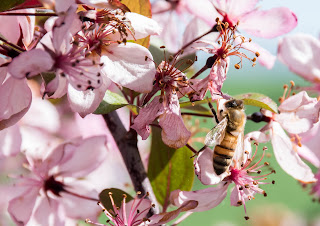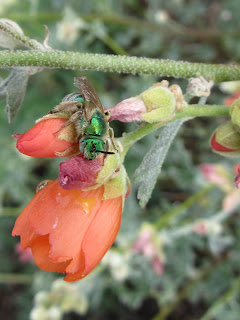Karla Salp
Communications
 |
Illegal plant sales can introduce or spread new pests,
such as this lily leaf beetle which was found
in gardens near Bellevue. |
Skyrocketing online sales since the
start of the pandemic put further pressure on a known potential
pathway for invasive plants and plant diseases to enter our state: illegal
plant sales.
The problematic issue came into the public eye in July of
2020 when reports of seed packets from China and other countries – some
solicited and some not – became widespread both in the U.S. and abroad.
The WSDA Plant Services Program had long been grappling with
this challenge – occasionally receiving reports from Washington consumers about
illegal plant sales on social media and through online retailers but not having
a clear path forward on how to effectively respond to complaints.
Fast forward to 2021 when WSDA started a first-of-its-kind
program to directly address the issue of illegal online sales of prohibited
plants: the Online Enforcement Program. With funding from the U.S. Department of Agriculture, the Plant
Services Program was able to dedicate the majority of one inspector’s time – Tristan
Carette-Meyers – to work with vendors to stop these illegal sales.
The problem – illegal
plants threaten gardens, farms, and the environment
 |
Blueberry scorch virus is one of the diseases
WSDA is trying to prevent in Washington
Photo credit: WSU Whatcom County Extension |
While it may seem that selling plants should be helping,
rather than harming, the environment, that is not always the case.
The sale of certain plants has been prohibited in Washington
because their invasive nature can overwhelm and out-compete native plants. This
has a downstream effect that impacts not only local plants but animals, food
sources, habitat, and more.
Secondly, the movement of some uncertified plants into
Washington has been prohibited because they pose a risk to the existing plants
and the agriculture industry. For example, blueberry plants cannot be shipped
into Washington unless certified disease-free. Washington is currently
the top producer of blueberries in the country. If diseased or infested plants
were to enter the state through unauthorized sales, it could decimate an entire
industry to the tune of millions of dollars annually.
But it is not only farmers who would suffer. Gardeners and
others who try to eat locally sourced food would soon be forced to look
elsewhere for blueberries that would otherwise grow quite readily throughout
the state.
The consumer-awareness
solution
Protecting the state from the threat that illegal plant sales pose requires both the public and the state to take action.
Whether the plant itself may be invasive or might introduce
a plant pest, consumers would be wise to protect their own gardens as well farms
and the environment by educating themselves about the state’s plant
quarantines.
Also, be discerning about where you purchase plants. Sales
through social media or online are the riskiest – there are just too many for
WSDA to monitor and many are not official businesses, making them difficult to
track or contact. The few dollars you may save will rapidly evaporate should
the plant you buy take over your garden or introduce a new pest or disease.
Buying from reputable, licensed, local nurseries familiar
with the state plant and pest quarantines dramatically reduces the risk that the
plant you buy will turn out to be Pandora’s box of problems.
While buying local does decrease your risk, you don’t have
to stop shopping online altogether. Just be sure to ask the online vendor
questions about the plant and their knowledge of Washington plant quarantines.
A reputable vendor will be familiar with them; you may want to shop elsewhere if they can't answer your questions satisfactorily.
The vendor-awareness
solution
_LI.jpg) |
Amazon is one vendor that has taken steps to prevent
the shipment of quarantined plants into Washington. |
While consumers can take steps to protect themselves by
ensuring they purchase from reputable distributors, WSDA’s new program has
already been hard at work. Since it started last October, the Online
Enforcement Program has contacted over 1,200 vendors about over 1,600 potential
plant sale violations.
The program has focused its efforts on both big and small businesses
– everything from eBay to Etsy. For example, due to the program’s efforts, Amazon
and eBay have now established filters to prevent the sale of prohibited plants
and other products from being available for shipment to Washington. WSDA has
also provided materials to these companies to provide to their vendors to prevent
future violations.
Because of their size, these platforms not only have the
potential to sell the most plants illegally, but correcting those problems also
has the potential to have the greatest benefit in protecting our state’s
nursery and agriculture industry.
On Etsy, the program reaches out to individual sellers about
potential violations. Etsy vendors have been particularly responsive.
When buying plants,
safety first
Buying plants is one of the simple pleasures in life that
can help people create their dream gardens. By working together, WSDA and
consumers can prevent those dreams from turning into the nightmare of
unexpected invasive plants, pests, and diseases. If you notice illegal plant
sales – whether in-person or online – email nursery@agr.wa.gov
to provide details (including links if it is online) about the incident.
3/21/23 Update: Since it
started in July 2021,
the Online Enforcement Program has contacted nearly 1,500 vendors about over 2,200 potential plant
sale violations.










_LI.jpg)